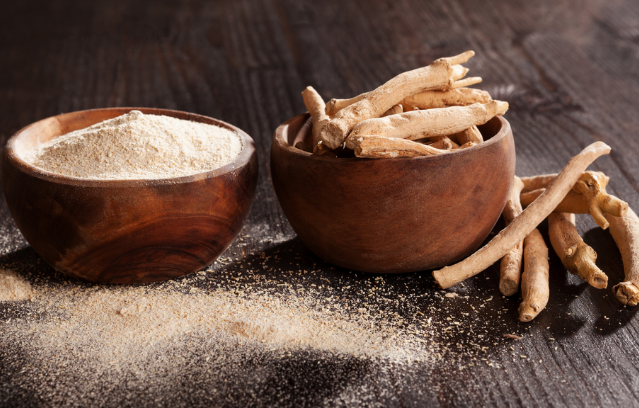
Ashwagandha belongs to a group of herbs known as adaptogens, which are used in the form of teas, powders, tinctures, supplements, or in their raw state for their health advantages. Ashwagandha is a plant with herbal roots and berries that is also referred to as Indian ginseng, winter cherry, or with its scientific name, Withania somnifera.
As Ayurvedic doctors and scientists from all over the world investigate Ashwagandha’s benefits against a range of illnesses, research on the herb continues to advance.
Here are a few Ashwagandha Benefits supported by Ayurvedic physicians.
1. Eases tension and stress
Perhaps the most well-known ashwagandha benefit is its capacity to reduce stress. This benefit is proven by numerous research, which show that ashwagandha considerably lowers individuals’ stress and anxiety levels.
According to one study conducted in Ayurveda, ashwagandha benefits the quality of sleep. Ayurvedic physicians found that when participants took the herb, they slept significantly better than when they took a placebo.
2. Reduces Fat and Blood Sugar
Ashwagandha benefits in lowering blood sugar levels and triglycerides (the most prevalent form of blood fat) in a few modest clinical studies.
According to one study, the blood sugar-lowering properties of ashwagandha are comparable to those of drugs used to treat type 2 diabetes.
3. Promotes Power and Muscle
The ashwagandha benefits in increasing muscle mass and strength are still being researched. Participants in one trial showed improved strength and speed.
Another study found that taking ashwagandha decreased cholesterol levels and body fat percentage while increasing muscle power. Some participants reported having better sleep as well, although this study did not contrast ashwagandha use with a placebo.
In a further investigation done by Ayurvedic physicians that included just male participants, ashwagandha benefits.
Men who received ashwagandha experienced significant reductions in body fat percentage and post-workout muscle damage, as well as improvements in muscle strength (as assessed by bench press and leg extension activities) and size in their arms and chests as compared to the placebo group.
4. Enhances Female Sexual Function
According to at least one clinical trial, ashwagandha benefits women who are having a sexual dysfunction. According to participant self-reports, the administration of ashwagandha benefits arousal, lubrication, orgasm, and satisfaction.
Additionally, it greatly increased the quantity of successful sexual interactions and reduced measurements of suffering related to their sexuality and reproductive lives.
5. Increases Men’s Testosterone and Fertility Levels
Separately, ashwagandha benefits to enhance testosterone levels in male but not female participants in a stress-related ashwagandha study.
A considerable rise in testosterone was also observed in a study conducted in Ayurveda, investigating the impact of ashwagandha benefits on male muscle strength.
6. Improves Memory and Focus
Ashwagandha benefits in enhancing mental acuity, memory, and the capacity for effective motor responses following instruction. Ashwagandha benefits in reducing participants’ reaction times during cognitive and psychomotor tests, which gauge participants’ capacity to follow instructions and carry out indicated actions, when compared to a placebo, according to small studies.
Ashwagandha benefits participants’ attention spans, as well as their short- and long-term memory across a number of tasks, according to one study.
7. Promotes Heart Health
Ashwagandha benefits largely, according to at least two studies, which may raise VO2 max levels, which are the highest oxygen levels you can inhale when working out.
These values are used to assess cardiorespiratory endurance or the efficiency with which the heart and lungs supply oxygen to the muscles during exercise. Therefore, higher VO2 max levels can be a sign of a heart that is in good health and functions effectively in certain conditions.
8. Ashwagandha benefits from pain
In a study, treatment with an aqueous extract of ashwagandha benefits and showed a significant rise in pain threshold (the threshold beyond which a trigger induces pain) compared to that of a placebo, demonstrating ashwagandha’s ability to operate as an analgesic drug. Having said that, the findings of this particular study might not be generalizable given that it only included healthy, active individuals as participants as opposed to a more diverse group.
9. Ashwagandha benefits and functions as a painkiller for arthritis
It is done so by halting the transmission of pain impulses to the brain. Additionally, it might have some anti-inflammatory qualities. Because of this, several studies have indicated that ashwagandha benefits in many types of arthritis, including rheumatoid arthritis. The herb showed promise as a rheumatoid arthritis treatment alternative when tested on 125 persons with joint pain, according to Trusted Source.
10. Treatments for Alzheimer’s
Several studies have looked at ashwagandha’s benefits in reducing or preventing loss of brain function in persons with neurodegenerative disorders like Alzheimer’s disease, Huntington’s disease, and Parkinson’s disease, claims a 2011 review by Trusted Source.
Memory loss and functional decline are caused by damage to the brain’s connective tissue as these disorders worsen. According to this review, ashwagandha benefits by providing protection when given to mice and rats during the early stages of a disease.
11. Ashwagandha benefits in Cancer
A few encouraging studies that suggest ashwagandha benefits by halting cell development in some tumors are also discussed by Trusted Source. In animal studies, this also involves a decrease in lung tumors.
Ways to Consume Ashwagandha
There are several ways in which ashwagandha benefits and can be consumed. Although ashwagandha roots and berries can be taken for their medicinal benefits, these days it is more frequently given in the form of supplement capsules, powder, tincture, or tea. To make ashwagandha milk, mix one or two teaspoons of powder with eight teaspoons of cardamom and a half teaspoon of cinnamon in two cups of milk.
Ashwagandha’s possible side effects and risks
Although ashwagandha is a safe and harmless herb, there are certain things to think about before incorporating it into your diet.
Do you use additional medications?
If you decide to use ashwagandha in your health regimen, it’s a good idea to let your doctor(s) know. Ashwagandha may strengthen or lessen the effects of other medications you are already taking if you take it.
Are there any other factors to take into account?
If you have a thyroid disorder, are pregnant, breastfeeding, immunocompromised, or are about to have surgery, you should avoid taking ashwagandha or prefer online consultation with Ayurvedic doctors. It’s also important to keep in mind that some individuals have trouble tolerating ashwagandha if they have allergies to particular grasses or nightshades. Consult your doctor physically or preferably online consultation, if any of these situations apply to you.
Taking Precautions When Using Ashwagandha:
Ashwagandha should be avoided in the following situations:
- Pregnancy\Breastfeeding
- Ailments, where the immune system targets the body’s own tissues, are referred to as autoimmune disorders.
- A recent procedure or one that will be performed soon thyroid conditions
Conclusion
An herbal remedy used in Ayurvedic medicine is ashwagandha. According to several studies, ashwagandha benefits arthritis, stress relief, and anxiety reduction, among other health advantages.
Before consuming ashwagandha, pregnant women and those with pre-existing medical disorders should consult their doctor.
Numerous studies undertaken up to this point have been tiny, involved animal testing, or suffered from poor design.
Because of this, scientists are unable to declare for sure whether the therapy is helpful. There needs to be more work. If a person decides to use this herb in their treatment regimen, they should first talk to their doctor about it.

